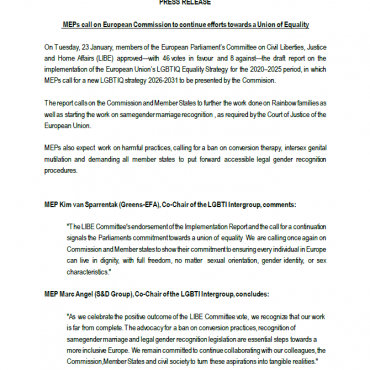The European Parliament strongly condemns Russia’s LGBT censorship laws
Today the European Parliament adopted a resolution on the upcoming presidential election in Russia, where it clearly denounces Russian laws which forbid the public mention of homosexuality or gender identity to minors.
 Presented by five political groups, the resolution recalls that Russia is subject to several international human rights agreements, including the European Convention on Human Rights and the International Covenant on Civil and Political Rights.
Presented by five political groups, the resolution recalls that Russia is subject to several international human rights agreements, including the European Convention on Human Rights and the International Covenant on Civil and Political Rights.
With this text, the European Parliament “strongly condemns the adoption by the Legislative Assembly of St Petersburg of a law against propaganda on sexual orientation”, and “equally condemns similar laws adopted in the Ryazan, Arkhangelsk and Kostroma regions”.
The Parliament further “calls on all Russian authorities to stop restricting freedom of expression in relation to sexual orientation or gender identity”.
Turning to Catherine Ashton, the Parliament concludes by calling on “the Vice-President of the Commission/High Representative to convey the European Union’s opposition to these laws”.
Earlier Michael Cashman MEP, Co-President of the Intergroup on LGBT Rights, had said that these laws’ “starting point is that homosexuality is wrong, but what is wrong is the promotion of intolerance and discrimination!”.
Sophie in ‘t Veld MEP, Vice-president of the LGBT Intergroup, also commented: “Tchaikovsky and Constantinovich must be rolling over in their graves. Such laws are simply unacceptable; if Russia isn’t serious about respecting the European Convention on Human Rights, it should simply call the bluff and leave the Council of Europe altogether. And more than statements, these grave human rights abuses must have consequences for the EU-Russia relationship!”
Read more:
- MEPs speak out against homophobic and transphobic censorship laws in Russia
- Catherine Ashton and MEPs receive petition on freedom of speech in Russia
- Open letter to the Legislative Assembly of St Petersburg: Don’t limit freedom of expression






